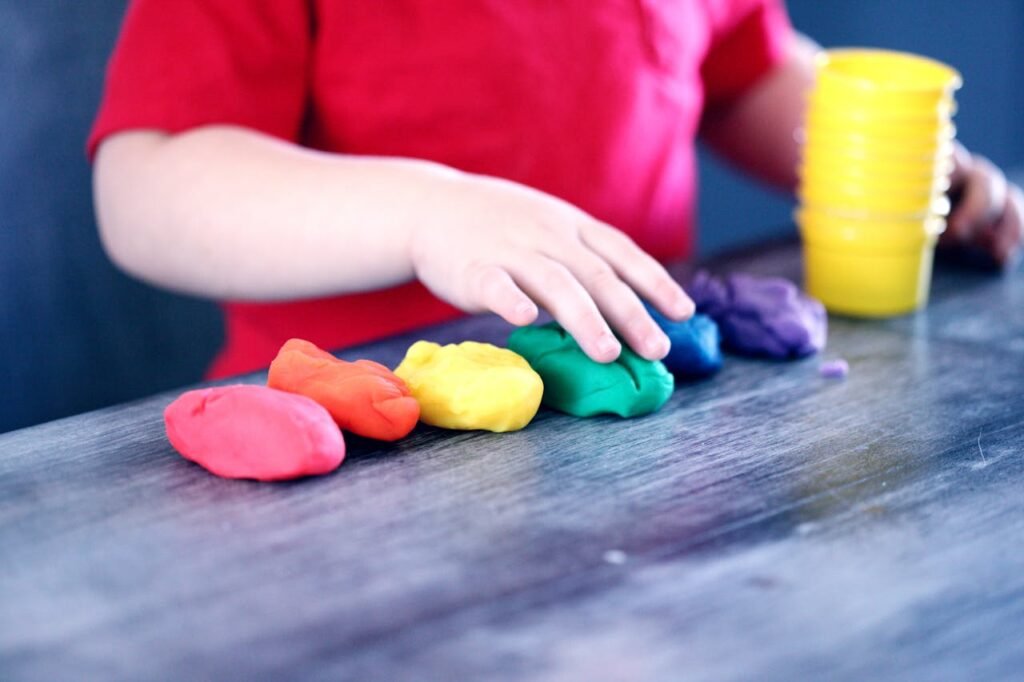If you’re a mompreneur with young children at home, then you know that finding a way to keep your children occupied and engaged so that you can find time to be productive in your business can be a huge struggle.
Maybe you feel like you’re in a cycle of constantly entertaining your child.
Maybe your child is having more screen time than you’d like because it just feels like the only way for you to get anything done.
As a mom who is juggling running my own business as a play and parenting coach, while also being the primary caretaker for my daughter, independent play has been a lifeline for me, and for many of the clients I work with.
And as someone who has worked in early childhood for 15 years, I can also tell you that independent play is incredibly important and beneficial parts of your child’s early years too. It allows for creativity and problem-solving. Plus, playing independently builds independence and confidence in other areas of your child’s life.
Learning how to encourage and incorporate independent play into your child’s daily routine can have a big impact on your productivity. Here are three ways to see more independent play from your child and get more work done from home as a result:
Be nearby.
Most young children cannot get deeply involved in play unless they feel secure that their caregiver is nearby within earshot and sight, especially if independent play is new to them. This may mean getting creative about where you work and where your child plays. Try placing a few favorite toys in the corner of your office or finding a spot in their playroom where you can send some emails.
Keep the time short at first.
If your child is used to you playing with them throughout the day or having screen time, starting with a small block of independent play time will help them build confidence. Start with five minutes at first and build on incrementally.
Know your child’s preferences.
Paying attention to what your child enjoys is a key part of supporting your child’s independent play journey. This is where play prompts and invitations to play can be effective. Putting out two things together that your child isn’t used to seeing—like a bowl of water and some animal figurines. Or placing a favorite toy in an unexpected location. Sometimes it’s just a little prompt that sparks play and gets them going.
If you are just starting the journey with independent play, remember that every child is unique. Some children might be more prone to play on their own, and some children might not. But I assure you that regardless of their temperament and personality, every child can learn how to play independently.
Jill Lerman, Play and Parenting Coach at Jillybeans NYC
Ready to see more independent play? This free resource that will help you get more time back for yourself while your child is learning and playing independently. Grab Jill’s free guide to independent play at any age!
Check out Jill’s website www.jillybeansnyc.com to learn more about how to work with her 1:1, join her monthly Playful Parenting membership, or listen to her podcast, The Art of Playful Parenting.
Find Jill on Instagram: www.instagram.com/jillybeansnyc
Jill Lerman is a play and parenting coach, early childhood educator, play expert, and a mom to a toddler. She empowers overwhelmed parents & caretakers to connect & engage with their little ones through simple invitations to play and create to help make parenting feel more joyful and manageable. She also serves as a play expert and consultant for brands, where she teaches classes, runs workshops, consults on product development, and provides activity ideas.
A mom herself, Jill knows how difficult getting through the day can be, which is why, above all else, her approach makes it easy for parents to facilitate interaction and play that supports development. She loves helping families create an environment and culture that sees children as capable from their earliest days, that values creativity, playfulness, bonding, and connection.


analisis de vibraciones
Equipos de balanceo: clave para el funcionamiento fluido y productivo de las maquinarias.
En el entorno de la avances contemporanea, donde la eficiencia y la estabilidad del dispositivo son de maxima significancia, los aparatos de calibracion desempenan un rol fundamental. Estos aparatos dedicados estan desarrollados para balancear y asegurar componentes rotativas, ya sea en equipamiento productiva, medios de transporte de movilidad o incluso en aparatos de uso diario.
Para los profesionales en conservacion de aparatos y los especialistas, operar con aparatos de balanceo es importante para garantizar el funcionamiento suave y fiable de cualquier mecanismo rotativo. Gracias a estas herramientas tecnologicas sofisticadas, es posible disminuir significativamente las vibraciones, el ruido y la carga sobre los soportes, aumentando la tiempo de servicio de elementos caros.
De igual manera significativo es el rol que juegan los aparatos de ajuste en la servicio al usuario. El apoyo experto y el conservacion regular empleando estos dispositivos facilitan proporcionar soluciones de optima nivel, elevando la agrado de los consumidores.
Para los duenos de empresas, la financiamiento en equipos de balanceo y detectores puede ser importante para mejorar la productividad y desempeno de sus dispositivos. Esto es sobre todo trascendental para los duenos de negocios que gestionan modestas y pequenas negocios, donde cada detalle es relevante.
Asimismo, los equipos de ajuste tienen una vasta uso en el campo de la proteccion y el monitoreo de excelencia. Facilitan detectar posibles fallos, reduciendo arreglos onerosas y averias a los aparatos. Mas aun, los resultados recopilados de estos aparatos pueden usarse para perfeccionar procesos y aumentar la visibilidad en motores de exploracion.
Las areas de implementacion de los sistemas de balanceo incluyen multiples areas, desde la manufactura de bicicletas hasta el monitoreo del medio ambiente. No importa si se trata de grandes manufacturas industriales o limitados locales hogarenos, los sistemas de calibracion son esenciales para asegurar un rendimiento optimo y libre de fallos.
analizador de vibraciones
Dispositivos de equilibrado: importante para el funcionamiento fluido y optimo de las dispositivos.
En el entorno de la innovacion contemporanea, donde la eficiencia y la confiabilidad del aparato son de gran trascendencia, los dispositivos de equilibrado juegan un papel crucial. Estos sistemas adaptados estan creados para equilibrar y estabilizar componentes rotativas, ya sea en maquinaria de fabrica, vehiculos de transporte o incluso en equipos caseros.
Para los expertos en mantenimiento de sistemas y los ingenieros, trabajar con equipos de ajuste es esencial para asegurar el desempeno estable y seguro de cualquier dispositivo movil. Gracias a estas opciones tecnologicas modernas, es posible minimizar notablemente las vibraciones, el estruendo y la presion sobre los rodamientos, aumentando la longevidad de elementos importantes.
Asimismo significativo es el funcion que cumplen los sistemas de equilibrado en la servicio al consumidor. El apoyo experto y el conservacion continuo utilizando estos aparatos habilitan brindar prestaciones de gran nivel, elevando la satisfaccion de los compradores.
Para los duenos de negocios, la inversion en sistemas de equilibrado y dispositivos puede ser fundamental para incrementar la eficiencia y productividad de sus sistemas. Esto es especialmente significativo para los empresarios que manejan modestas y intermedias organizaciones, donde cada aspecto importa.
Asimismo, los aparatos de equilibrado tienen una amplia implementacion en el campo de la proteccion y el supervision de estandar. Facilitan encontrar potenciales errores, reduciendo reparaciones onerosas y perjuicios a los aparatos. Mas aun, los resultados generados de estos equipos pueden aplicarse para mejorar procesos y potenciar la reconocimiento en motores de consulta.
Las zonas de uso de los equipos de ajuste incluyen variadas ramas, desde la fabricacion de transporte personal hasta el seguimiento ecologico. No importa si se considera de enormes elaboraciones de fabrica o pequenos espacios hogarenos, los sistemas de balanceo son esenciales para garantizar un desempeno productivo y libre de detenciones.